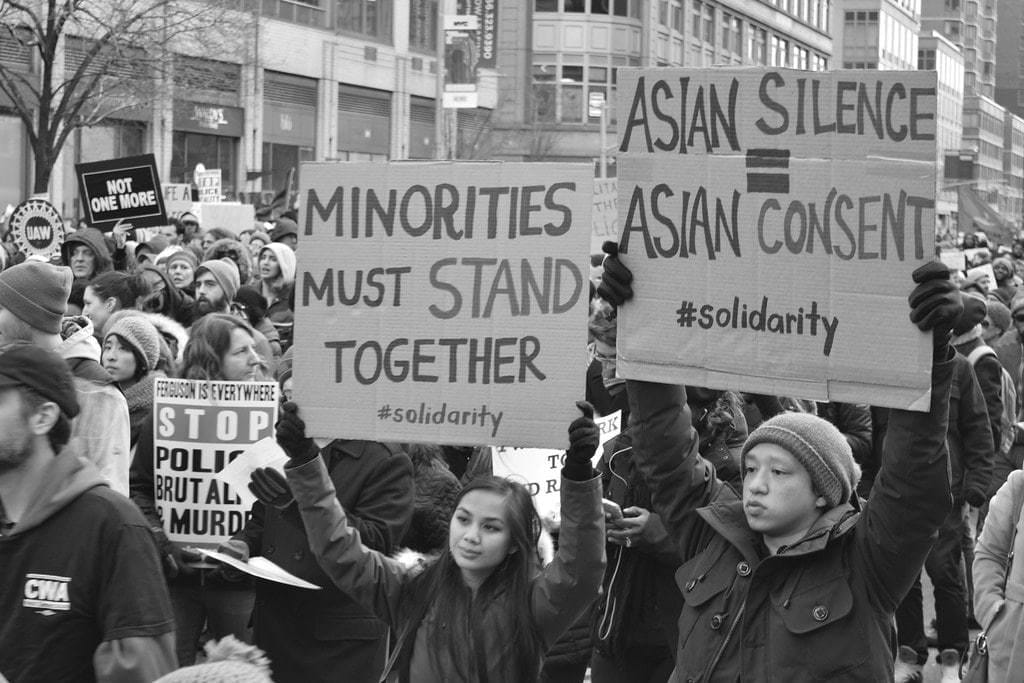Betrayed by the model minority myth

By Aaron Chen, BA Law and Chinese
The model minority myth is the stereotype that ESEA (East and Southeast Asian) diaspora are, amongst other attributes, the hardest working, most successfully assimilated and least threatening minority group. Yet given the rise of anti-ESEA hate crimes occurring all over the world, the Covid-19 pandemic has proven that it serves to silence our voices and invalidate our experiences of discrimination because we are ‘not really’ an ethnic minority.
‘Because of the model minority myth that pits Asians as the successful minority group that other minority groups should aspire to be like, when crimes against Asians are committed, it may not gain public attention,’ says Janice Gassam Asare in Forbes.
As Lunar New Year festivities draw to a close, ESEA communities around the world will be reflecting on the difficulties that the Covid-19 pandemic has brought. Amidst the stresses and anxieties of living in uncertain times, ESEA communities have had to experience a pluralism of pandemics – one of which being a pandemic of racism.
This time last year, my classmates and I were preparing to host the SOAS Lunar New Year party. I had made a huge order of Cantonese baked delicacies from a Chinatown bakery and was equally as excited for the food (carefully selected by yours truly) as I was for the performances.
However, the day before our big night, I received a call from a very distressed lady speaking a blurred mixture of English, Cantonese and Mandarin. As confused as I was, I soon realised it was the manager of the Chinatown bakery asking to confirm whether I still wanted to proceed with my order. At that point only ten Covid-19 cases had been reported in the UK, but that week she had received countless cancellations and a huge decline in sales. Today, the bakery is closed indefinitely.
Just recently, the US had seen a string of attacks targeting elderly Asian-Americans. One of which was an assault on an 84 year old Thai immigrant who was slammed to the ground by his attacker in San Francisco and later died as a result of the injuries. Just days later, a 91 year old Chinese man was violently pushed from behind to the ground, causing severe injuries.
While it would be difficult to prove that they were motivated by race, there exists an undeniable link in statistics reported by Stop AAPI Hate. Formed in response to the rise in race-related violence during the pandemic, they’ve reported 2800 counts of hate crimes directed towards Asian-Americans in 2020.
Back in the UK, we have also seen our own outbreak of anti-ESEA hate crimes. Between January and June 2020, Metropolitan Police had recorded 457 counts of hate crimes targeting ESEA people.
In February 2020, Singaporean-Chinese student Jonathan Mok was violently attacked on Oxford Street whilst being told, ‘I don’t want your coronavirus in my country.’ Most recently, Filipino-born NHS nurse Aldarico Jr. Velasco was called a ‘f****** Chinese c***’ by a patient during his shift in an East Midlands hospital.
At the heart of this is the racialisation of Covid-19. This virus has been personified and given the face of an ESEA person, quite literally, by the UK media. It took a petition started by British-born Chinese podcaster Viv Yau to hold the UK government and media outlets accountable for depicting ESEA in Covid related media.
She raises the important point that although ‘Chinese people make up around 0.7% of the population in the UK… the rate at which Chinese or other East/Southeast Asian people are depicted in coronavirus related stories is disproportionate.’ As of 27 February, the petition had been signed almost 20,000 times.
Before I finish, I want to bring it back to where I started – at a struggling business in London’s Chinatown. On 21 February, Kova Patisserie Chinatown took to social media to reveal that their store front had been purposefully vandalised. ‘It wasn’t a random attack, the suspect came fully prepared and splashed the shopfront with black paint,’ they shared on their Instagram account.
The UK government is yet to release a statement condemning the rise of anti-ESEA racism and we continue to live without support and some sense of inclusion. As British-Chinese MP Sarah Owen suggests, ‘include our community in the conversation – give us a seat at the table.’
Given the uncomfortable facts and my own experiences as a British-born Chinese man, it’s clear to me that the model minority myth is a lie. While there is a common misconception that it acts as a form of protection, in reality, it is more a tool of oppression and is silencing our cries for help. My people are dying, and it’s being justified.
Photo caption: Asian Americans redressing the model minority myth. (Credit: Wikimedia Commons)



